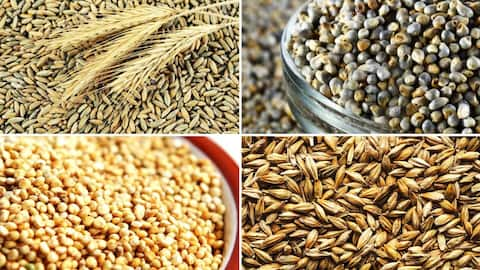Ancient grains and their amazing health benefits
What's the story
Throughout human history, grains have been essential for nourishing civilizations across the ages. While modern diets often prioritize convenience over tradition, there's a growing appreciation for the nutritional richness and time-tested wisdom of ancient grains. These grains, cultivated by our ancestors across diverse cultures, offer not only sustenance but also a plethora of health benefits.
Smallest grain
Teff: The tiny nutrient powerhouse
Teff, a staple in Ethiopian cuisine, is the smallest grain in the world but packs a nutritional punch. High in protein, fiber, and essential minerals like calcium and iron, teff supports muscle repair, bone health, and oxygen transport in the body. Its complex carbohydrates provide sustained energy, making it an excellent choice for athletes and those with active lifestyles.
Versatile grain
Freekeh: A versatile grain for eye health and culinary delights
Freekeh boasts a rich supply of carotenoids like lutein and zeaxanthin, linked to reducing the risk of eye disorders. However, due to its gluten content, it is not suitable for individuals with celiac disease. With its earthy, nutty flavor and a texture of brown rice, freekeh is a versatile grain ideal for enhancing soups, stews, casseroles, and summer salads.
Satiety
Farro: The ancient wheat
Farro, is an ancient variety of wheat that originated in Mesopotamia. Rich in fiber, protein, and vitamins, farro provides sustained energy release and supports digestive health. Its unique blend of nutrients contributes to improved metabolism, reduced risk of chronic diseases, and enhanced satiety, making it an excellent addition to a balanced diet. It stands out as an excellent substitute rice, quinoa, buckwheat, and barley.
Fiber
Bulgur: A fiber-rich grain for healthy eating
Crafted from cracked durum wheat, bulgur finds its place in salads or stands as a substitute for rice.. With its substantial fiber content, bulgur aids digestion, regulate blood sugar, and facilitate weight loss. However, being a wheat product, individuals sensitive to gluten should abstain from consuming it. Often available in a parboiled form, bulgur allows for swift preparation, adding convenience to its nutritional benefits.
Bone health
Amaranth: Ancient grain, modern superfood
Amaranth, a staple in Aztec cuisine, is gluten-free and rich in protein, fiber, calcium, magnesium, and phosphorus. Its high lysine content complements other grains. Beneficial for bone health, immunity, and potentially lowering cholesterol, amaranth's diverse nutrients promote overall well-being. Its fiber aids digestion and may aid weight management. Amaranth's versatility and nutritional density make it a valuable addition to any diet.
